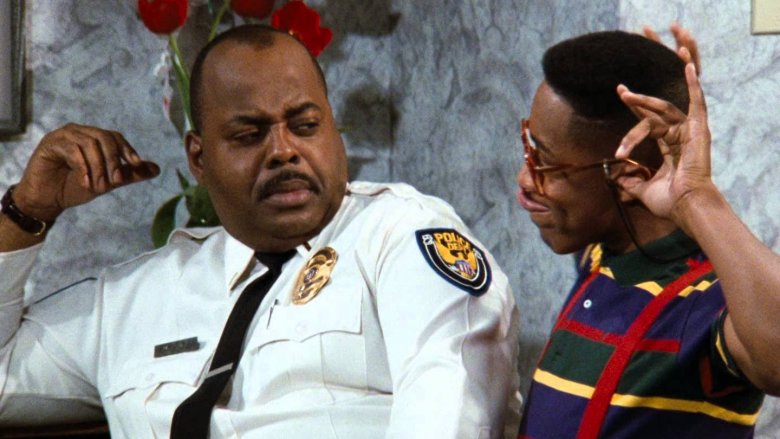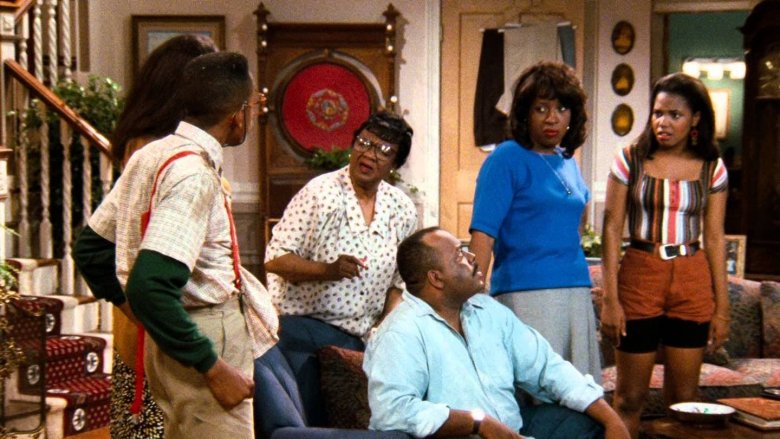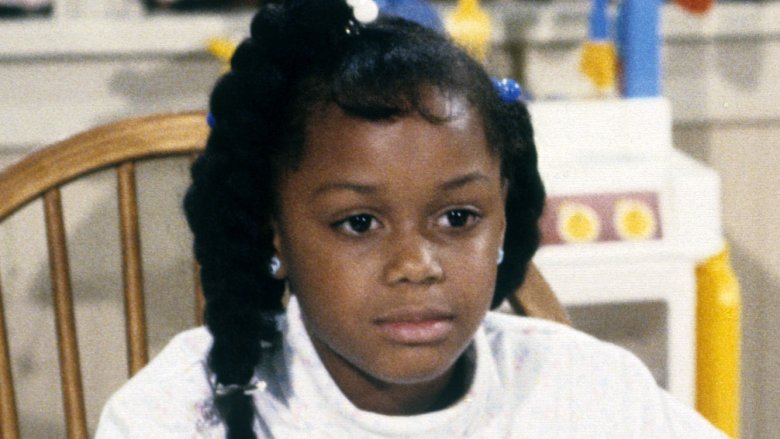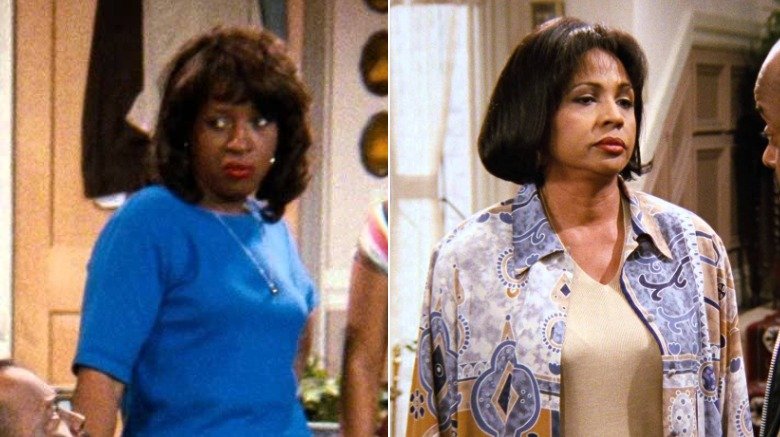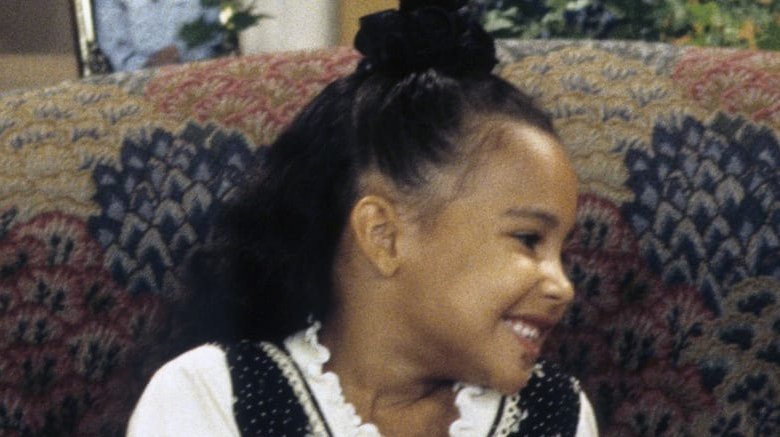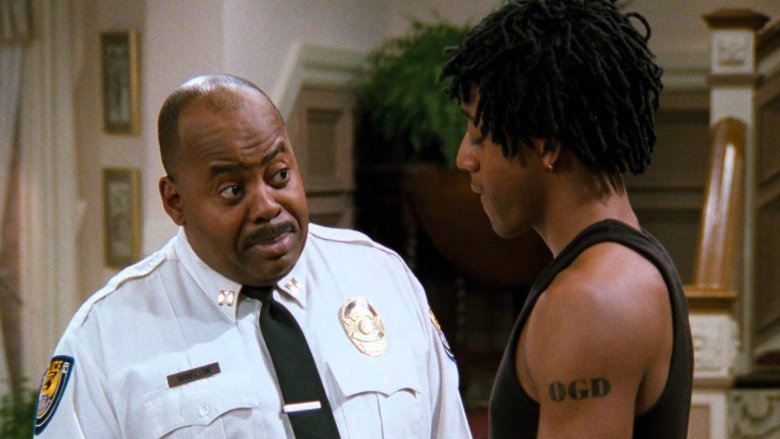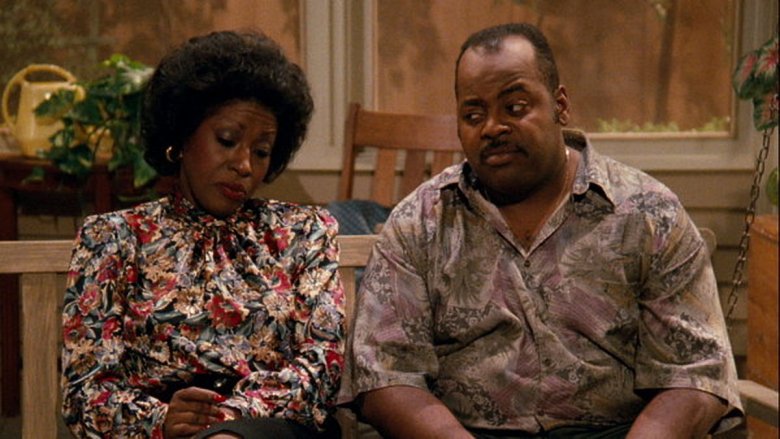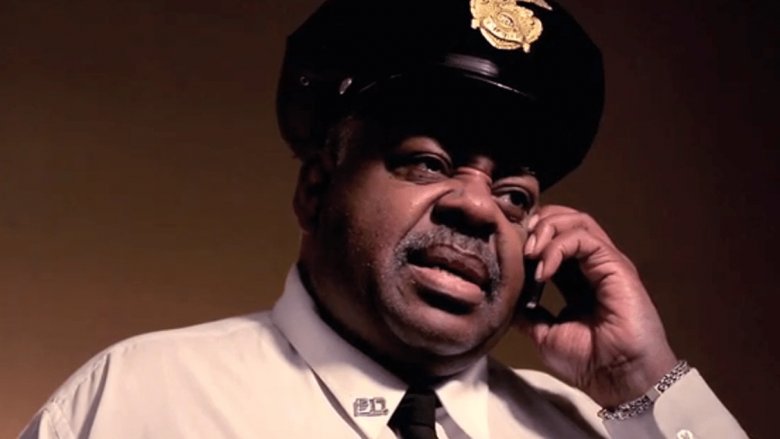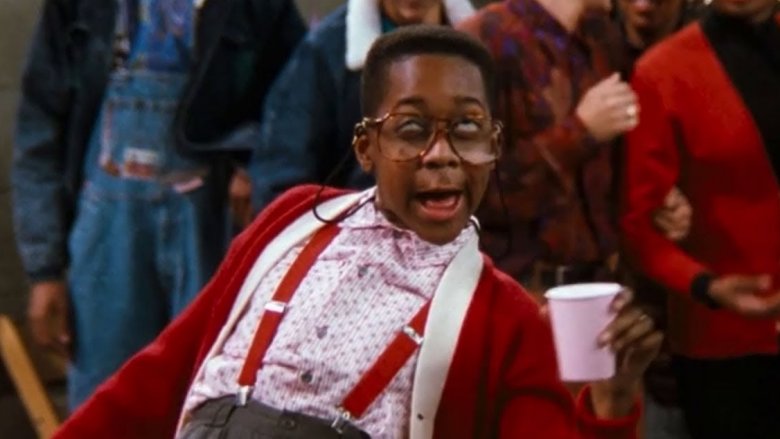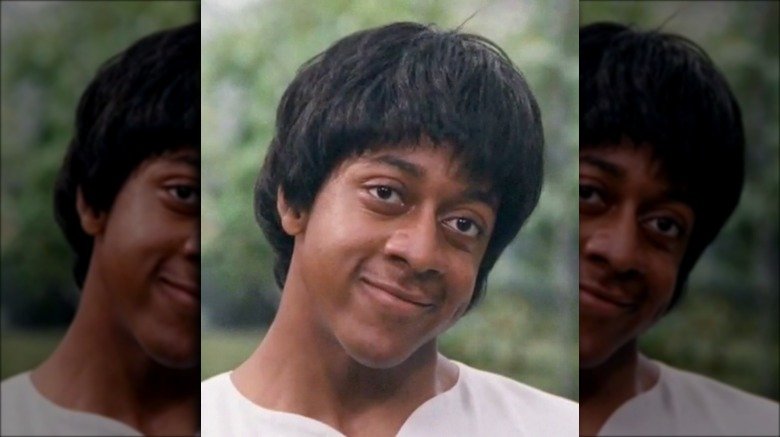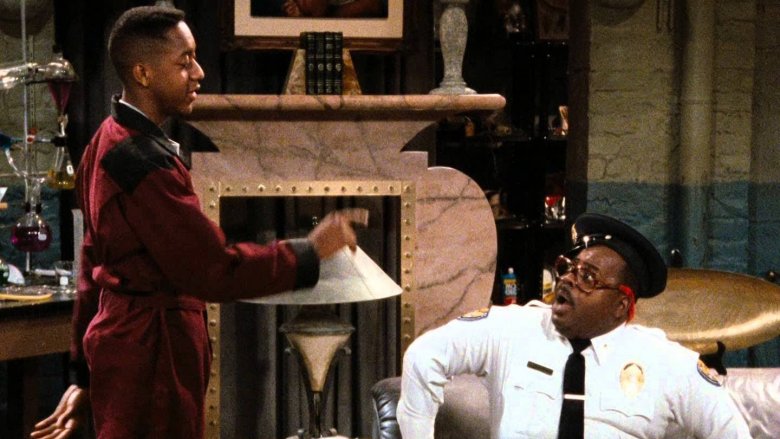Things Only Adults Notice In Family Matters
Family Matters was an institution on ABC's TGIF lineup from 1989 to 1997, when it switched over to CBS for its ninth and final season in 1998. For an entire generation of kids, Steve Urkel and the Winslow family were celebrated sitcom icons. While the popular TV show aired for 215 episodes in the end, making it one of the longest-running series with a predominantly black cast, it never really disappeared after going off the air. Syndication meant that Family Matters would continue airing reruns for years, while an entirely new generation of kids could later tune in through streaming services.
However, now that the show's OG audience are adults, it's changed quite a bit. Through a combination of advanced age, wisdom, and perspective, there are several things about Family Matters that have left us all asking questions. For instance, how did we react to characters inexplicably leaving or changing? Did we ever notice how creepy Urkel was, how strange the show had become before the end, or how ahead of its time it might have been? Since the answers are probably "no," here are some things only adults notice in Family Matters.
Taking us for a spin
Most kids probably watched Family Matters without ever cluing in to the fact that Jo Marie Payton's character, sitcom mom Harriette Winslow, was originally on another sitcom (via The Hollywood Reporter). This might be because the show in question, Perfect Strangers, wasn't actually aimed at a younger audience. Additionally, Harriette was only a recurring character — an elevator operator — during the preceding series' third and fourth seasons.
While the Winslows notably move into lead characters Larry and Balki's building during the latter season of Perfect Strangers, audiences don't meet Harriette's family until the "Crimebusters" episode, in which husband Carl (Reginald VelJohnson) plays a central role. Harriette leaves by the following year, as ABC went on to give Payton her own series in 1989 ... the one we all know and love her from. At the time, Perfect Strangers even ran some promotional spots to help with the transition and introduce the rest of the Family Matters cast.
Another reason '90s kids might have overlooked this spin-off connection? TV Series Finale notes that Family Matters shifted focus off of the Winslow family to their relationship with Steve Urkel (played by Jaleel White) due to the character's growing popularity. Looking back, it's strange to think that Payton, not White, was the original star of Family Matters.
Where'd Judy go?
Children are probably more forgiving (or just don't care as much) about inconsistencies on TV, but when a character disappears entirely from a show without any mention, we adults can't just let it slide. That's what happens to Harriette and Carl's youngest child, Judy Winslow, who goes upstairs at the end of season four and inexplicably never comes back down. Not only does she physically vanish from the show, she's never mentioned again and her absence is never explained.
If you ask the actress who played Judy, Jaimee Foxworth, where she went, she might tell you, "I'm still up there in my closet, putting on my clothes" (via People). According to co-creator William Bickley, the decision to cut Judy was "a budget consideration." As for the lack of explanation, he told People, "The official name is denial, hoping the audience won't notice." Well, he might have gotten his wish through the show's younger audience members at the time, but adult viewers surely spotted it and now the rest of us are cluing in. Sadly, Judy's erasure has since gone even further than just on-screen, as Foxworth has also been left out of reunion photoshoots and any discussion of a potential series revival.
A new Harriette
If you haven't watched Family Matters since you were a kid, your memories of the show were probably formed during its strongest seasons. However, the series' ratings had declined by the time the sitcom switched networks, and, according to the Los Angeles Times, Jo Marie Payton was set to leave at the end of what ended up being the last season. However, she didn't quite make it that far.
After Payton left halfway through season nine, Judyann Elder took over the role of Harriette for the final nine episodes, as reported by Entertainment Weekly. It was a jarring switch for audiences and cast members alike. "It's like getting a divorce and then marrying somebody else," TV husband Reginald VelJohnson told the publication in 2017. Meanwhile, Darius McCrary — a.k.a. TV son Eddie Winslow — said, "I felt like my mom was gone."
While rumors of a behind-the-scenes rift began swirling after Payton's mid-season departure, the actress has denied any negative feelings on her end. "I think that maybe my leaving, like I said, it kind of upset a few people but like I said, you know, it was time for me to go," she told TV Series Finale in 2010. "It was time for the show to go, I wish we could've gone down maybe a little bit earlier, so maybe we could have gone out with the [finale] that everybody feels like, we missed, you know what I mean?"
Did you recognize these future stars?
While Family Matters made household names out of a few of its stars, the show also hosted plenty of other big name actors on its set over the years. Now, you wouldn't have recognized these A-listers during the sitcom's original run, because many of them were total unknowns at the time. However, landing a gig on Family Matters undoubtedly helped launch a number of careers.
Just two years before starring in I Know What You Did Last Summer, Freddie Prinze Jr. made his acting debut as a "tough guy" on Family Matters, according to GQ. Meanwhile, the AV/TV Club reports that Gabrielle Union also got her start playing an uncredited mall girl on the show. As a child, Glee's own Naya Rivera landed a recurring gig as Gwendolyn, and later tweeted that "getting to ride into a scene in a Power Wheels Jeep on Family Matters" was one of her fondest memories from her childhood acting days. Want us to go on? Terrence Howard was still a relative newcomer to the industry when he played John in the episode "Opposites Attract," while Vivica A. Fox landed a small part in "Jailhouse Blues" long before becoming a recognizable name. Family Matters also cast both Trina McGee before she hit it big on Boy Meets World and Michael McDonald prior to his MadTV days. Phew! That's a lot of future star power.
Challenging respectability politics
Fans may have been primarily drawn to Steve Urkel's zany antics and the overall comedic premise of Family Matters, but the show also had some poignant moments. Yes, Urkel was a brutal exaggeration of a nerd and was often the butt of the jokes, but on at least a few occasions, this sitcom demonstrated a knack for being ahead of its time. As noted by the AV/TV Club, this is showcased in a particularly effective episode called "Original Gangsta Dawg," which discusses identity and respectability politics.
When Urkel's cousin, Cornelius — a.k.a. OGD — stays at the Winslow's house for a few nights, there's a huge divide between himself and Carl right away. While OGD grew up with a natural distrust of the police, Carl sees him as a thug because of how he dresses, talks, and acts, and even tells him, "Maybe if you didn't come off like a criminal, you wouldn't be treated like one." Most likely due to show's time and genre constraints, the resolution may have come in an all-too-simple way. However, Family Matters doesn't force either side to conform or change who they are. It allows OGD to continue in his ways, while challenging Carl to expand his definition of respectability.
Tackling racism
Considering the fact that it featured a predominantly black cast, Family Matters was bound to explore racism at some point — but what makes this topic noteworthy, especially for adults tuning in today, was how unreserved this lighthearted comedy was when tackling the matter. In "Good Cop Bad Cop," the show takes on racial profiling by police officers after Eddie is pulled over for matching the description of a carjacker. When Carl confronts the cops in question, who both happen to be white, their weak defense is, "It's dark. It's a black guy," and "[He was] in the wrong part of town." Similarly, daughter Laura Winslow receives a racist note which tells her to "go back to Africa" during Black History Month in "Fight the Good Fight." She later sees that someone has spray-painted the N-word on her locker.
For a sitcom aimed at young people, these were startling looks at systemic and blatant discrimination. Of course, Family Matters didn't delve into these issues in depth very often. To do so would be difficult, as the AV/TV Club suggests, "within the boundaries of the heartwarming, blue-skies tone that had become Miller-Boyett's house style." However, episodes like these gave many young viewers their first exposure to the ugliness of racism, even if they may not have truly grasped what they were seeing at the time.
The forever cop
Reginald VelJohnson makes for a pretty darn convincing police officer. You may not have noticed this as a youngster, but you probably do now — and so does every casting director from New York to California. While VelJohnson's role as Carl Winslow in Family Matters helped solidify his reputation as one of the most famous police officers in TV history, it wasn't his first time playing a cop, nor his last.
The actor's first foray in the uniform came in 1984's Ghostbusters. His prison guard role turned out to be a gift from the beloved comedy's director after losing out on playing Winston to Ernie Hudson. "They flew me out to California, and it was between me and him," VelJohnson told The Hollywood Reporter in 2015. "And since it was so much trouble, Ivan Reitman said 'let me do something for you,' and gave me the prison guard." Next in line were cop parts in Die Hard and Turner & Hooch, and following his popular turn as Carl, he's taken on police officer roles in Die Hard II, Chuck, Girl Meets World, and TV movies. VelJohnson may not understand the connection, but he isn't mad about being type-cast. "I don't know what it is about me and this cop thing, but I get a lot of cop offers," he continued. "Everyone always assumes that I'm someone on the force, but as long as they are paying me, I will play a cop until the day I die."
Steve Urkel, the stalker
Perhaps because of the time period in which Family Matters aired or because of its younger audience, but many viewers used to accept that while Steve Urkel was often unbearable in his pursuit of Laura, he was ultimately non-threatening and therefore harmless. However, looking back at it now, it's pretty shocking that audiences tolerated this type of creepy behavior. Of course, Urkel wasn't the only so-called "adorkable misogynist" seen on-screen, as the Pop Culture Detective dubbed characters of his ilk. The likes of Sixteen Candles, Revenge of the Nerds, and The Big Bang Theory have all played with this ugly trope.
For his part, Urkel virtually preys on Laura for decades. Since Kindergarten, she constantly thwarts his advances in ways that don't hurt his feelings, but when she takes on a firmer stance with him, such as in "Marriage 101," Urkel is made out to be the victim. As highlighted in a piece by The Mary Sue, it's only when the tables are turned and a female chases a male — in this case, Myra Monkhouse pursuing Urkel himself — that the audience sees just how gross this behavior is. We may have overlooked it as kids, but as adults, we can't help but notice just how uneven the show was in its treatment of women and stalking.
The problem with Bruce Lee Urkel
While Family Matters dealt with racism effectively on more than one occasion, it also dabbled in it a little. For some background info on this, Bruce Lee broke a number of barriers when he became a force in the film industry in the late '60s, and helped other Asian actors get cast in roles portraying Asian characters over white actors donning yellowface (via The Wrap). However, in a tragic twist, Lee's popularity and iconic image made him into an appealing impersonation subject by the late '80s. It's here that Family Matters gets into trouble.
On three occasions, Steve Urkel dresses up as the character Bruce Lee Urkel, wearing a wig that resembles Lee's haircut, speaking with an offensive Asian accent, and mocking many of Lee's fighting mannerisms. For most kid viewers at that time, this likely didn't register as offensive, because, as noted by The Ringer, it was unfortunately par for the course in pop culture. While caricatured, stereotypical depictions of Asian people and cultures are no longer acceptable these days, that doesn't mean they don't still exist in different forms, according to The Guardian. However, few creators today would ever try to get away with what Urkel did in the mid-'90s.
Jumping the shark
If you rewatch Family Matters from beginning to end, you might realize just how strange the show gets during its final years, when its descent into the realm of science fiction is pretty steep and even a bit clumsy. Sure, there were strange story lines early on, like when Urkel builds a predatorial robot in "Robo-Nerd," but things later changed dramatically. In fact, Key and Peele once poked fun at the series' progressive craziness with its own "Family Matters" skit, in which Carl confronts the show's producers for these off-the-wall plots, saying, "In the next episode, Steve turns Carl into a giant sandwich and accidentally eats him. This is supposed to be about me and my family."
It's true. Family Matters begins as a blue-collar family sitcom and ends up devolving into a science fiction show about Steve Urkel and his weird inventions (via Bustle). By the series finale, he's lost in space. However, this phenomenon didn't go unnoticed by some of the actors. "Jaleel came in and it was fun to have him there and all, but of course it did the same thing Happy Days did [with the Fonz character]," Jo Marie Payton told TV Series Finale. She added, "The show was kind of running out of air, what they call 'jumping the shark.'"

